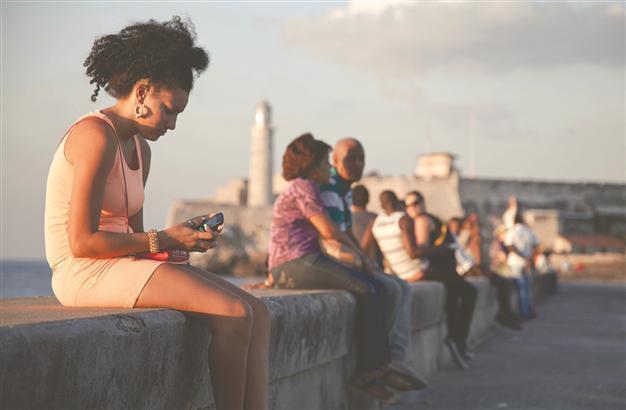United States secretly built ‘Cuban Twitter’ to stir unrest
WASHINGTON

A woman uses her cellphone as she sits on the Malecon in Havana. The USAID masterminded the creation of a ‘Cuban Twitter,’ according to revealed documents. AP photo
The U.S. government masterminded the creation of a “Cuban Twitter,” a communications network designed to undermine the government in Cuba, built with secret shell companies and financed through foreign banks, The Associated Press has learned.The project, which lasted more than two years and drew tens of thousands of subscribers, sought to evade Cuba’s stranglehold on the Internet with a primitive social media platform.
First, the network would build a Cuban audience, mostly young people; then, the plan was to push them toward dissent. Yet its users were neither aware it was created by a U.S. agency with ties to the State Department, nor that American contractors were gathering personal data about them, in the hope that the information might be used someday for political purposes.
The project, dubbed “ZunZuneo,” slang for a Cuban hummingbird’s tweet, was publicly launched shortly after the 2009 arrest in Cuba of American contractor Alan Gross. He was imprisoned after traveling repeatedly to the country on a separate, clandestine mission for the U.S. Agency for International Development (USAID) to expand Internet access using sensitive technology that only governments use.
Documents show the U.S. government planned to build a subscriber base through “non-controversial content”: news messages on soccer, music, and hurricane updates. Behind the scenes, ZunZuneo’s computers were also storing and analyzing subscribers’ messages and other demographic information, including gender, age, “receptiveness” and “political tendencies.” USAID believed the demographics on dissent could help it target its other Cuba programs and “maximize our possibilities to extend our reach.”
Smart mobs
ZunZuneo’s organizers wanted the social network to grow slowly to avoid detection by the Cuban government.
Eventually, documents and interviews reveal, they hoped the network would reach critical mass so that dissidents could organize “smart mobs” - mass gatherings called at a moment’s notice - that could trigger political demonstrations, or “renegotiate the balance of power between the state and society.”
For more than two years, ZunZuneo grew and reached at least 40,000 subscribers. But documents reveal the team found evidence Cuban officials tried to trace the text messages and break into the ZunZuneo system.
USAID said that ZunZuneo stopped in September 2012 when a government grant ended.
“The moment when ZunZuneo disappeared, (it) was like a vacuum,” said Guerra, the ZunZuneo user.
“In the end, we never learned what happened. We never learned where it came from.” The Cuban government has a tight grip on information, and the country’s leaders view the Internet as a “wild colt” that “should be tamed.” ZunZuneo’s leaders planned to push Cuba “out of a stalemate through tactical and temporary initiatives, and get the transition process going again toward democratic change.”
The estimated $1.6 million spent on ZunZuneo was publicly earmarked for an unspecified project in Pakistan, public government data show, but those documents don’t reveal where the funds were actually spent.
Unclear if it is legal under US law
It is unclear whether the scheme was legal under U.S. law, which requires written authorization of covert action by the president and congressional notification. Officials at USAID would not say who had approved the program or whether the White House was aware of it. The Cuban government declined a request for comment.
USAID and its contractors went to extensive lengths to conceal Washington’s ties to the project, according to interviews and documents. They set up front companies in Spain and the Cayman Islands to hide the money trail, and recruited CEOs without telling them they would be working on a U.S. taxpayer-funded project.
USAID said in a statement that it is “proud of its work in Cuba to provide basic humanitarian assistance, promote human rights and fundamental freedoms, and to help information flow more freely to the Cuban people,” whom it said “have lived under an authoritarian regime” for 50 years. The agency said its work was found to be “consistent with U.S. law.”
















